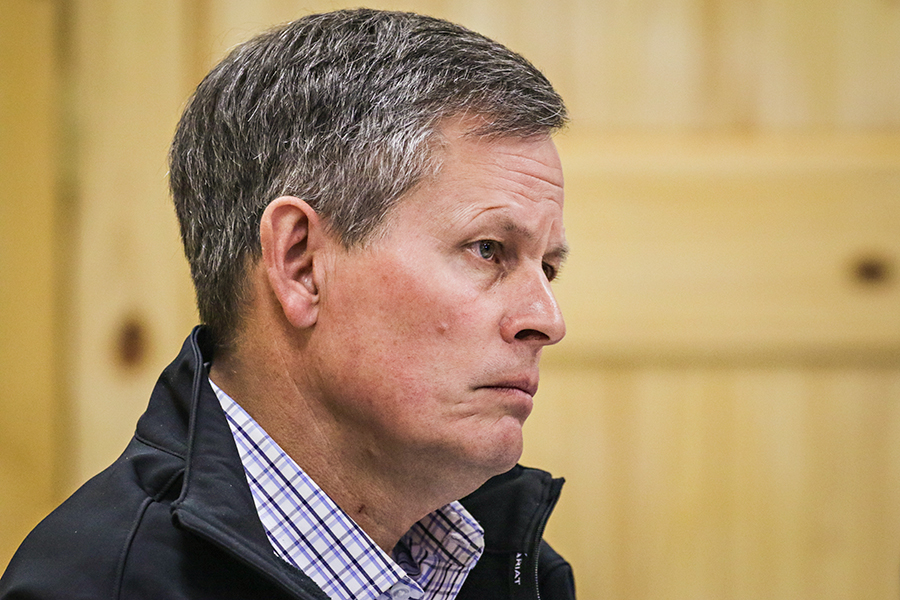Shutdown Stretches to Record-Breaking Length as Senate Negotiators Try to Reach a Deal
Montana’s Sen. Steve Daines and Rep. Ryan Zinke spoke with the Beacon about their thoughts on the ongoing shutdown. Both Republicans, the lawmakers echoed their party’s sentiments blaming the shutdown on Democrats, who in turn fault the GOP’s refusal to negotiate on Affordable Care Act subsidies.
By Mariah Thomas
The country reached “a sad milestone” Wednesday, said Montana U.S. Sen. Steve Daines, as the federal government shutdown stretched into its 36th day, breaking a 2019 record for the longest government shutdown in U.S. history.
As of Friday morning, the shutdown continued into day 38, still without a definitive off ramp, though senators on both sides of the aisle are reportedly engaging in negotiations to get a deal across the finish line.
Affordable Care Act subsidies, which have lowered insurance premium costs for consumers who make up to 400% of the federal poverty level since the COVID-19 pandemic, remain at the shutdown’s center. Democrats in the Senate have dug in, refusing to pass a continuing resolution to fund the government unless ACA subsidies are part of the deal. Republicans have decried the Democrats’ position, arguing Democrats are trying to score political points by keeping the government shut down.
Those cries are ones Daines and U.S. Rep. Ryan Zinke, both Montana Republicans, echoed in interviews with the Beacon this week.
“I think everyone recognizes the problem with Obamacare and rising rates, 60%, you know, rates have gone up, and there are flaws in that program,” Zinke said. “Everyone realizes that on both sides of the aisle. On the shutdown, this one is more about protesting than it is about policy. And unfortunately, as it goes forward, it hurts people that just want to get by.”
Both Daines and Zinke remain opposed to extending the ACA subsidies. They each cited fraud within the program, and Daines said the issues with the ACA are systemic. Throwing more money at the problem won’t solve it, Daines said.
But partisan finger-pointing over the shutdown’s causes hasn’t dulled its impacts across the country and state.
Daines and Zinke named several issues constituents have raised concerns with their offices about. Federal employees haven’t received pay — in Glacier, the Beacon found park employees reported a lack of information as the shutdown started, and park advocates called for a full closure to preserve the park, which didn’t happen. Benefits for the Supplemental Nutrition Assistance Program failed to go out across the country at the beginning of November, affecting more than 77,000 Montanans and piling onto gaps food banks were already struggling to fill. Grants funding Head Start programs, including one on Montana’s Hi-Line, have stalled. On Wednesday, Transportation Secretary Sean Duffy announced the Federal Aviation Administration will order a 10% cut in flights across 40 major airports, and flight delays are to be expected.
The Senate is working toward gaining 60 votes on a continuing resolution to reopen the government. The House has been out of session for a month as the shutdown presses onward. Daines, the longest-serving member of Montana’s delegation, spoke about his perspective, as did Zinke, who serves the state’s western half on the House side.
On the Senate side, most Democrats have voted against a continuing resolution 14 times. Three — Sen. John Fetterman, D-Penn.; Sen. Cortez Masto, D-Nevada; and Sen. Angus King, I-Maine, who caucuses with Democrats — have crossed the aisle, voting with Republicans to open the government.
In Daines’ view, it’s contingent on five more Democrats to reach across the aisle to reopen the government. But he claimed the Senate minority leader, Chuck Schumer, is “ruling with an iron fist, and is afraid for his political future.”
Namely, Daines said, Schumer’s fear is of a Senate primary challenge from New York Rep. Alexandria Ocasio-Cortez, a fellow Democrat. Ocasio-Cortez has yet to announce any intention of jumping into that Senate race, though some politicos have suggested she may be eyeing Schumer’s seat or a presidential run.
“Remember, [Schumer] voted for a clean CR back in March, when the Democrats joined us last time we had this crisis, and we averted it, and he was vilified by his far-left political base,” Daines said. “So, he’s scared, politically, of his far-left political base. And so, what you’re seeing now quietly is a number of more moderate Democrats are reaching out to us, and they want to try to get a deal.”
Other outlets have reported that Democratic negotiators are working on a deal with Senate Majority Leader John Thune, R-S.D., although it’s unlikely the shutdown will end before the weekend. One suggestion being floated, per POLITICO, is a deal to fund the government through December and vote on some year-long funding bills.
But still other Democrats have been emboldened by Tuesday night’s election results, which saw Democratic victories in high-profile races across the country. House Minority Leader Hakeem Jeffries urged his Senate counterparts to “hold the line” on their ACA demands. And Schumer spoke on the Senate floor Wednesday morning, saying the election offers a reason for Republicans to negotiate with Democrats to end the shutdown.
“Last night was a great night for America and a five-alarm fire for Donald Trump and Republicans,” Schumer said. “The Republicans’ high-cost house is on fire, and they’ve only got themselves to blame… As loudly and clearly as they could have, the American people said last night: enough is enough.”
President Donald Trump posted on Truth Social that his absence from the ballot and the ongoing shutdown were the factors that led to Republican losses Tuesday. The president has used his influence to call for an end to the filibuster — the rule requiring 60 votes for Senate consensus — in order to end the shutdown on party lines. Several Republican senators, however, told reporters Wednesday they wouldn’t be in favor of that.

While most of the shutdown drama has focused on the dealmaking efforts in the Senate, the House has been out of session since before the shutdown.
Typically, the House does remain open during a shutdown. It can pass appropriations bills to end the shutdown, but its activities may be limited. The House did pass a version of the continuing resolution to keep the government funded.
“The House — we’ve done our job,” Zinke said. “We’re waiting for the Senate to do theirs.”
He added that he sits on the appropriations committee, which he said has passed all its bills out of committee.
Zinke also announced his support for a constitutional amendment earlier this week that would stop Congress from being paid or receiving backpay during a government shutdown. In his eyes, a shutdown means Congress has failed in its duties, and he said congressional members shouldn’t receive pay when they don’t deliver for the American people.
As for finding a way out of the shutdown, Zinke said he remains an “optimist.”
“Montana is a great place to live, a great place to raise a family, a great place to be from,” Zinke said. “I remain an optimist, but you know, you can’t solve problems from one side of the aisle only. You really got to work together as a nation, and again, if there’s one concern, it’s just the anger and the vitriol and the hatred. And all of us in leadership positions, you know, we have to address it and do our part to temper it and just focus on getting things done.”



